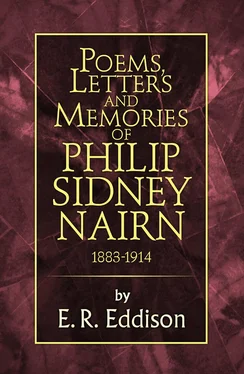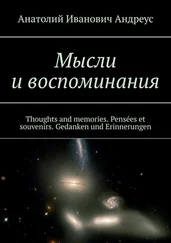Of the defects of my share in the book I am painfully aware. It has been written in time of war, on Sundays or on late evenings, in such moments of leisure as could be found amid urgent official duties. In more favourable circumstances the area of correspondence covered might have been widened, and the balance of the whole better adjusted.
In my estimate of Nairn’s character I do not pretend to be judicial. I have, however, kept a watchful eye on the pardonable leanings of a friend’s judgment towards mere eulogy. I have made no statement which has not been weighed, nor any which I do not believe to be true.
I desire to thank my friend Mr Henry Nairn for the compliment he has paid me in asking me to undertake this work, and for the assistance and information which he has ungrudgingly placed at my disposal. Also my old friend Captain M. H. Woods, for permitting me to take his name in vain. For the local and historical particulars of Kelantan I am chiefly indebted to Mr W. A. Graham’s book, which is, I believe, still the chief authority on that State. I must finally record my obligations to the Editors of the Pall Mall Gazette and the Malay Mail , who have kindly consented to the reproduction of poems which appeared originally in their publications. Two sonnets, Exile and In the Buchheide , appeared in the Pall Mall Magazine , now incorporated with Nash’s Magazine . Finally, it may be noted of the pictures that Nairn appears in all of them.
E. R. E.
November, 1915.
CHAPTER I CONTENTS Cover Title Page POEMS, LETTERS, AND MEMORIES OF PHILIP SIDNEY NAIRN ARRANGED BY E. R. EDDISON Late of Trinity College, Oxford PRINTED FOR PRIVATE CIRCULATION LONDON, 1916 Copyright List of Illustrations Preface I. Introduction II. Family, Birth, and School Life III. Oxford and Stettin IV. Kelantan and the Federated Malay States V. Life and Literature POEMS MISCELLANEOUS POEMS: Exile To J. C. Desiderium To E. R. E. (on receiving a certain letter) To Miss M. H. In the Buchheide The Dawn of Love Retrospect A Fallen Socrates Reverie Rejected Verse Blore’s To Smudge – my Dog To my German Class To Mrs Honey For Jess For Miss E. S. To Phoebus Apollo For Barbara For Miss E. Brown For Miss M. Brown Advance, Australia! ‘Altogether Piffle’ Why Not? At Parting To the Unknown Goddess To J. M. C. Off Malacca Sundown in the Rains To E. R. E. (on news of his engagement) Fragment Trois Ans Après Hélas F. M. S. DITTIES: To my Nearest Neighbour The Point of View Mischievous The Volunteer Dance ‘He slumbered in Carcosa’s stead’ Metamorphosis Upon the Troublesome Times The Seats of the Mighty Day-dreams or Nightmare? Furious Driving Still the Everlasting ‘Dreadnought’ Some Quatrains from the Selangor Golf Club TRANSLATIONS: Near to my Love Night Late Summer The Asra Anacreon’s Grave To my Absent Love Ultimus Cursus Vitae Appendix I Appendix II Footnotes Also by E. R. Eddison About the Publisher
INTRODUCTION CONTENTS Cover Title Page POEMS, LETTERS, AND MEMORIES OF PHILIP SIDNEY NAIRN ARRANGED BY E. R. EDDISON Late of Trinity College, Oxford PRINTED FOR PRIVATE CIRCULATION LONDON, 1916 Copyright List of Illustrations Preface I. Introduction II. Family, Birth, and School Life III. Oxford and Stettin IV. Kelantan and the Federated Malay States V. Life and Literature POEMS MISCELLANEOUS POEMS: Exile To J. C. Desiderium To E. R. E. (on receiving a certain letter) To Miss M. H. In the Buchheide The Dawn of Love Retrospect A Fallen Socrates Reverie Rejected Verse Blore’s To Smudge – my Dog To my German Class To Mrs Honey For Jess For Miss E. S. To Phoebus Apollo For Barbara For Miss E. Brown For Miss M. Brown Advance, Australia! ‘Altogether Piffle’ Why Not? At Parting To the Unknown Goddess To J. M. C. Off Malacca Sundown in the Rains To E. R. E. (on news of his engagement) Fragment Trois Ans Après Hélas F. M. S. DITTIES: To my Nearest Neighbour The Point of View Mischievous The Volunteer Dance ‘He slumbered in Carcosa’s stead’ Metamorphosis Upon the Troublesome Times The Seats of the Mighty Day-dreams or Nightmare? Furious Driving Still the Everlasting ‘Dreadnought’ Some Quatrains from the Selangor Golf Club TRANSLATIONS: Near to my Love Night Late Summer The Asra Anacreon’s Grave To my Absent Love Ultimus Cursus Vitae Appendix I Appendix II Footnotes Also by E. R. Eddison About the Publisher
There are men and women of such vitality of spirit, in whom the roots of thought, of action, and of affection seem so firmly set, so safely and naturally engrafted on those abiding principles of reason, efficiency, and goodness which are the starting-point and the goal of all sane philosophy, that the mere calling of them to mind seems to question the finality of death. The barriers of the grave at the passage of such souls, put off, after the first bitterness of sorrow, their irrefragable and inexorable darkness, shrinking to a reality more tolerable and more transient; as, in Meredith’s romance, the palace of Rabesqurat, Mistress of Illusions, was dissipated in the light of the Lily. This instinctive sense of death as transition, not dissolution, is a rare consolation left by such personalities to relatives and friends bereaved. It is independent of all creeds and philosophies: a conviction to be fostered if we are wise, if only because it is productive of a saner and truer habit of mind in thinking of our friend. That for the term of this life we have lost him, that in the height of his youth and promise his career has been cut short, is hard enough. But it is treason to the memory of one who had in his whole nature nothing akin to death to think of him as annihilated; a condition, moreover, the possibility of which is an assumption as arbitrary and as repugnant to the developed consciousness as the crudest myth of primitive society. There is deep truth and justice underlying the saying of the dear old Abbé Jérôme Coignard: ‘Votre crapaud à tête de chat n’est pas plus véritable que la Nymphe de monsieur que voici; et de plus, c’est une invention dégoûtante .’
Of such a quality of vital power and being was Philip Sidney Fletcher Nairn. And I have said so much to explain why in writing of my friend I will not use the tone of a funeral oration. According to medical authority, death came to him suddenly and painlessly on that May evening on the coast of Negri Sembilan. Changing his clothes for dinner after a motor drive, he was seized by an attack of haemorrhage, and in half a minute all was over. He was spared the misery of an illness. It would have been difficult for those who loved him to wish him a more merciful ending. Nor is there any gain in dwelling on this last momentary sad scene of a full and happy life. To name him calls up his image in settings far different: his fine athletic figure at work in the ‘scrum’, or braced against the wind on the Pikes of Scafell, or dark against the sunset on the level summit of the Pillar; or deep in a big armchair reading aloud perhaps, Webster, Meredith, or Omar, talking of books or plays, spinning yarns, guessing at the riddles of the Sphinx, in some of our rooms at Trinity on one of those noctes ambrosiana , sacred to youth and friendship, redolent of tobacco-smoke and wine; or on some wilder nox Neroniana , when the bonfire shamed the stars, and as night grew old the ‘Alpine Club’, of which he was no obscure member, went secretly forth to new conquests. Or, most familiar to those who were with him in the East, the picture of him that belongs to the last seven years of his life, living the free active life that he loved, laying in able, thorough, and human administration the foundations of a career that promised to be of high distinction and Imperial value.
In person, Nairn was what the sagas call mikill ok sterkr – a big man and a strong. In height he was over 6ft 3in., and 13 stone in weight. Unlike many tall men, he was well knit and well proportioned. His complexion was very fair, until the tropics tanned it; his hair very fair, his features well cut, his eyes blue. He was short-sighted and always wore pince-nez. His voice was pleasant, strong, and expressive; his laugh big and merry, and of a quality to make others laugh with him. At rest, his expression was grave and alert, but the humorous lines were always ready to show themselves at the corners of his mouth and eyes. His manner to strangers had a certain courtliness, but he could at need be truculent enough. He was quick-tempered, but not a bearer of malice. He was a good observer and a judge of men. It was well said of him that his friends prized his friendship the more because he did not suffer fools gladly. The whole effect of his presence was singularly buoyant and sunny. With his intimate friends he adopted, when in good spirits, a tone half mocking, half hectoring, and entirely delightful. The nearest thing to it I can think of in literature is the jesting bravado of Mercutio. Its charm is incommunicable, except in so far as it may be caught in certain passages of his diary and private letters reproduced in this volume.
Читать дальше












